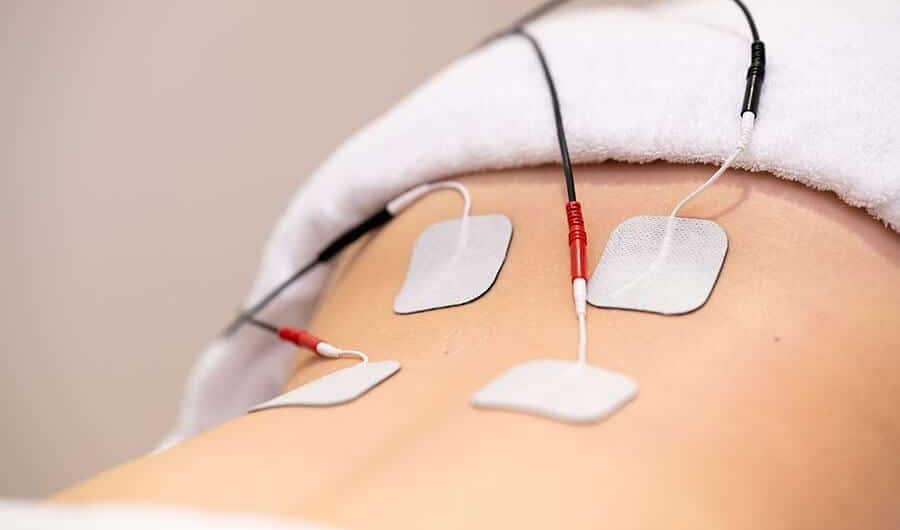Transcutaneous Electrical Nerve Stimulation (TENS)
Transcutaneous Electrical Nerve Stimulation (TENS) is a popular, non-invasive pain relief therapy that uses low-voltage electrical currents to alleviate pain. It has been widely used in clinical settings and by individuals for managing both acute and chronic pain. TENS is particularly effective in treating conditions like arthritis, back pain, sports injuries, and even nerve pain.
MSK
1/4/20253 min read


What is TENS?
TENS involves the application of electrical impulses through the skin to stimulate the nerves in a targeted area. These impulses are delivered via electrodes that are placed on the skin near the pain site. The machine generates mild electrical currents that travel through the skin to the underlying nerves. The stimulation works by either blocking pain signals from reaching the brain or by triggering the release of endorphins, the body’s natural painkillers.
How Does TENS Work?
There are two primary mechanisms by which TENS provides pain relief:
Gate Control Theory of Pain: According to this theory, electrical impulses from the TENS unit stimulate nerve fibers in the skin that block the transmission of pain signals to the brain. This reduces the sensation of pain.
Endorphin Release: The electrical stimulation can also encourage the release of endorphins, which are natural chemicals produced by the body to reduce pain and improve mood.
Benefits of TENS Therapy
TENS is a versatile and accessible pain relief option. Here are some of the key benefits:
Non-invasive and Drug-free: TENS therapy does not involve medications or invasive procedures, making it an appealing option for those who prefer non-pharmacological treatments.
Pain Relief for Various Conditions: TENS has been shown to be effective for a wide range of pain conditions, including chronic back pain, osteoarthritis, fibromyalgia, and post-operative pain.
Home Use: One of the most appealing aspects of TENS is its portability. Many devices are small and user-friendly, allowing patients to use them at home or on the go. This convenience makes it easier to manage pain on a daily basis.
Minimal Side Effects: Compared to pharmaceutical pain medications, TENS has few side effects, with the most common being skin irritation from the electrode pads. These side effects are typically mild and can be minimized by ensuring proper electrode placement and skin care.
Customizable Settings: Many TENS units offer adjustable settings for pulse intensity, frequency, and duration, allowing users to tailor the therapy to their specific pain levels and preferences.
Who Can Benefit from TENS?
TENS therapy can be beneficial for a variety of individuals dealing with different types of pain. Some of the conditions that may benefit from TENS include:
Chronic Pain: People with conditions such as arthritis, fibromyalgia, and chronic back pain often turn to TENS as a way to manage ongoing discomfort.
Post-surgical Pain: TENS can aid in the recovery process by helping to control post-operative pain.
Sports Injuries: TENS can be used to alleviate pain and promote healing for sprains, strains, and other musculoskeletal injuries.
Labor Pain: Some women find TENS helpful as part of their labor pain management strategy, as it offers a drug-free alternative.
Neuropathic Pain: Conditions like diabetic neuropathy or sciatica may also benefit from TENS therapy to reduce nerve-related pain.
How to Use TENS Safely
While TENS is generally considered safe, it is essential to follow the manufacturer's instructions and consult with a healthcare provider before starting treatment. Some important safety tips include:
Correct Placement of Electrodes: Ensure that the electrodes are placed properly to target the right nerves. Incorrect placement can reduce the effectiveness of the therapy.
Avoid Certain Areas: TENS should not be used over broken skin, near the eyes, on the throat or head, or near the heart (such as on the chest) without medical supervision.
Monitor Skin Health: To prevent skin irritation or burns, it’s important to check the skin regularly where the electrodes are applied and use hypoallergenic pads if necessary.
Consult a Healthcare Provider: Individuals with certain conditions, such as epilepsy, pregnancy, or heart problems (including pacemakers), should consult with a healthcare provider before using TENS therapy.
Conclusion
Transcutaneous Electrical Nerve Stimulation (TENS) is a promising and accessible option for those seeking relief from various types of pain. Whether used for acute pain, chronic conditions, or post-operative recovery, TENS offers a non-invasive, drug-free solution with minimal side effects. Its flexibility and ease of use make it a viable option for pain management, providing patients with a safe and effective way to regain control over their health and well-being.
If you’re considering TENS as part of your pain management strategy, it’s always a good idea to discuss it with your doctor or healthcare provider to ensure it’s the right option for your individual needs.
Read more
Physiotherapy in Bali
Your Path to Optimal Health.
Contact us
Subscribe us
© 2024. PT BUMI MEDIKA BALI. All rights reserved.
